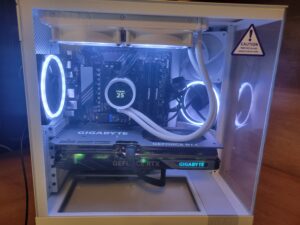 In today’s digital age, where our lives are intertwined with technology, encountering PC issues is not uncommon. Whether it’s a slow computer, a tech support scam, hardware malfunction, software glitches, or something else – dealing with these problems can be frustrating. One of the burning questions many users have is: How long does it take to repair a PC? Let’s delve into this topic to understand the variables that influence repair times and what you can expect during the process.
In today’s digital age, where our lives are intertwined with technology, encountering PC issues is not uncommon. Whether it’s a slow computer, a tech support scam, hardware malfunction, software glitches, or something else – dealing with these problems can be frustrating. One of the burning questions many users have is: How long does it take to repair a PC? Let’s delve into this topic to understand the variables that influence repair times and what you can expect during the process.
Issue Complexity: The complexity of the problem plays a significant role in determining repair time. Minor issues like software conflicts or driver updates can often be resolved relatively quickly – if you find a fast computer repair company – usually within a few hours. However, more complex issues such as hardware failures or severe virus infections may require several days to diagnose and fix.
Diagnosis Phase: The initial phase of PC repair involves diagnosing the problem accurately. This step is crucial as an incorrect diagnosis can lead to ineffective solutions and wasted time. I always tell people that diagnostics might be the most important part of a repair. Depending on the issue’s nature, the diagnostic phase can take anywhere from a few minutes to several hours. Not all techs are created equal.
Repair Techniques: The methods used to repair your PC also impact the time frame. For software-related issues, technicians may employ tools to scan for malware, repair corrupted files, or reinstall operating systems. These tasks can be completed in minutes or be completed within a day or two depending on a variety of factors. On the other hand, hardware repairs such as replacing a faulty hard drive or upgrading components may take longer, especially if parts need to be ordered.
Availability of Resources: Availability of resources such as spare parts, software licenses, and skilled technicians can affect repair times. If a specific component needs to be replaced and it’s readily available, the repair process can be expedited. However, sourcing rare or specialized parts may cause delays.
Service Provider: The expertise and efficiency of the service provider also play a vital role. Reputable computer repair centers with experienced technicians often have streamlined processes that result in faster turnaround times. Conversely, choosing an inexperienced or unreliable service provider may lead to extended repair durations.
Communication and Updates: Transparent communication between you and the repair service is essential. A reliable service provider will keep you informed about the progress of your PC repair, any unexpected challenges encountered, and an estimated completion time. Regular updates can help manage expectations and reduce anxiety about repair delays.
Preventive Measures: In some cases, preventive measures may be recommended during the repair process to avoid future issues. This could include installing security software, updating drivers regularly, or implementing hardware upgrades. While these steps may add extra time to the repair process, they can enhance your PC’s overall performance and longevity.
Customer Cooperation: Your cooperation and responsiveness also contribute to timely repairs. Providing accurate information about the issue, promptly approving repair recommendations, and following any post-repair instructions can help expedite the process.
In conclusion, the time required to repair your PC can vary significantly based on factors such as the complexity of the issue, diagnosis accuracy, repair techniques, availability of resources, service provider efficiency, communication, preventive measures, and customer cooperation. While some repairs may be completed within hours, others could take several days or longer. Choosing a reputable and experienced repair service, staying informed, and actively participating in the repair process can help minimize downtime and ensure a successful outcome for your PC.


